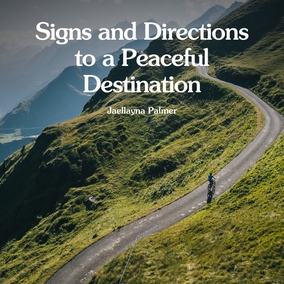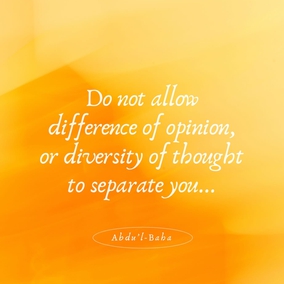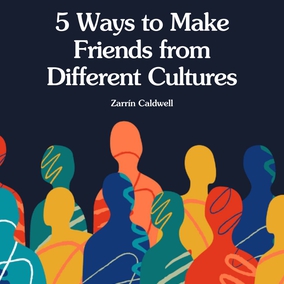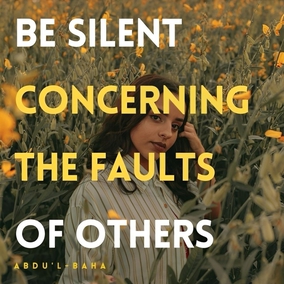The views expressed in our content reflect individual perspectives and do not represent the authoritative views of the Baha'i Faith.
One memorable quotation swam around what had become the swamp of my mind back in September 2005, following the unthinkable murder of a close friend (doesn’t this only happen in the movies?). Cut down by the fire and vengeance of a sadly embittered ex-husband, my friend Ethel wasn’t coming back. The effort of trying to apply this hard lesson in the real world helped me deal with and accept the reality of the situation: I was not going to wake up from this bad dream.
The quotation comes from one of my favorite Baha’i books, The Hidden Words, in which Baha’u’llah so poetically created such pearls of wisdom that I keep it close at all times, turning to it for guidance in times of need or confusion. The passage reads:
My calamity is My providence, outwardly it is fire and vengeance, but inwardly it is light and mercy. Hasten thereunto that thou mayest become an eternal light and an immortal spirit. – The Hidden Words, p. 15.
In the past it often took me a while, sometimes a very long while, before I saw the wisdom in what I had first thought unfair or unjust.
Later I’d realize the calamity had indeed been providence, like the time I quit a job I loved, and my husband, Don, retired from his, in order to move to the East Coast where I was to become Program Director at a school and he would serve as a full-time volunteer in charge of maintenance. The job fell through at the eleventh hour. Stunned and shaken, we wondered, Why? Several months later, Don’s mother became terminally ill and was petrified of going into a nursing facility. With both of us unencumbered by duty to a job, we were free to go to Ohio and be her caregivers, allowing her to remain in her own home for the last three months of her life. After she died, I understood the calamity of the job loss had, in fact, been a providential gift to all three of us.
But murder? Of a close friend? That went beyond anything I ever expected to experience on a personal level. I knew I should be patient and wait until my Aha! moment came, suddenly and on its own, but it was just too horrific to put out of my mind. My brain seemed to need to make some sense of this, so I sought answers.
I telephoned my friend, Molly King, to tell her about the tragedy. Molly and her husband were both enduring physical challenges, and I hated to burden her, but knew she’d want to know. Molly overcame her shock quickly, and with a steely resolve evident in her voice, declared, “Something positive will come of this.” As she said it, I suddenly realized that in just the few hours since Ethel had so cruelly and pitilessly been wrenched from us, things had already occurred that would have brought joy to her heart—that in fact did bring joy to her heart.
Ethel had longed to share her Faith with her co-workers, but though Baha’is are encouraged to teach and spread the healing message of this unifying religion, we are also exhorted to speak only to a willing and interested ear; proselytizing is forbidden. So Ethel spent her years in the Oxnard (California) School District being quite circumspect in telling others verbally what she believed; instead, as was mentioned by a fellow teacher at her funeral, she became a living example of the Baha’i teachings.
Shortly after hearing the news, people at the school from which Ethel had just retired called the local Baha’i community for information about Ethel’s faith. They planned to schedule their own memorial service for her. In death, Ethel reached more people than she ever did while she walked this mortal plane.
Marrying this philosophical observation to Baha’u’llah’s spiritual Hidden Word, I figured that the more painful the situation, the more beauty can come from it. Ethel planted within her students seeds of self-esteem and belief in themselves. Several of them spoke of their love and appreciation at her service. The seeds of the power of fairness and living an ethical life joined with a giving nature that embraces all with a natural enthusiasm and appreciation. Those seeds, watered and nourished by the blood she shed, will continue to grow and create a bountiful harvest.
Ethel’s legacy will, I’m convinced, be the providence derived from the calamity, the light and mercy that will descend on those she left behind.
You May Also Like
Comments

















Thank you.